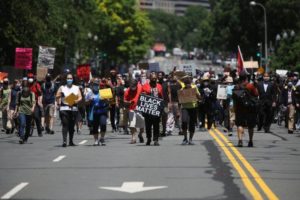The massive protests being felt around the world these past weeks may lead us to different opinions and judgements of what is occurring and why. What is incontrovertibly true, however, is that grief leads naturally to protest, and protest expresses grief. This truth reveals a circle that demands our collective attention.
What is grief but a deep inner protest against loss? We want back what we had, and we want our lives to be what we think they are supposed to be.
What is protest but the passionate objection to what has happened? Individually, when we grieve, we protest the loss of the person we love, the home we had, the past we thought we had, the life we believed we would have — that precious sense that we have control over our lives.
Grief is more than a set of emotions, although it is that. It is more than an experience that happens to us internally, passively sitting within our souls awaiting the release that comes through mourning. No, grief is more. Grief is a core human faculty, explains Francis Weller, a psychotherapist specializing in the communal nature of grief.
I believe that grief is a gift from God that transforms individual humans into co-equal humanity, a community that blesses and feels and absorbs the sorrow. Grief is absolutely essential to being human, to being fully alive. When we cannot experience, own and befriend our grief, we cannot sustain our hearts. Although alive and breathing, something inside us hardens and hibernates.
Does it sound odd that there cannot be true life without loss? To faithful Christians, this understanding will resonate. There is no true connection to God without his loss of his precious son, sent to Earth to bring us back to our true selves, our connectedness to our creator who misses us. Without Christ’s death and resurrection, we have no certain path to God. So, even the creator experienced deep loss. Why should we humans not have losses?
No. Loss and grief are essential to human life. But our culture pushes it away, shoves it down, tries to speed it up, ignores its pain, and forces the bereaved into an unnatural, solitary silence. When we should all be keening as a community, wailing our human family’s pain, we sit back and maybe even condemn the grief that is — as I write — being shouted out in the streets.
Protests are demonstrative. When people are bereaved, they cannot help but show it. The deep griefs that African American and other people of color have experienced are being taken up in communal outcries of worldwide protests. These outcries are grief-filled craters of sorrow. The outcries of people grieving for their families, their pain, and the life they desire beg for the world’s communities to stop, bear witness and hold them sacred. Only through expression of this traumatic pain caused by living on the margins can such grief even begin to heal. Only with the communal support of the world’s people holding this sorrow sacred can change and repair — often called reparation — happen.
The tempest of grief-driven protest from George Floyd and similar, innumerable other wrongful deaths can be the catalyst for genuine social change. In a letter in 1945, Carl Jung expressed “The opus consists of three parts: insight, endurance and action. Psychology is needed only in the first part, but in the second and third parts moral strength plays the predominant role.”
People of color have endured. Now, they are acting, and many moral people of every skin tone are acting with them. I cannot condone destructive, criminal acts such as rioting, looting and attacking one another, but action is necessary, and it is happening. Insight, too, is needed for change, and such insight can be gained with others’ help and through deep self-reflection.
Our Catholic Church calls upon us to be self-reflective people of faith and of love. We are the problem. We are the solution. We can be the change. Jesus often told people to mind their own business, to take care of their own souls before messing with the souls of others. This communal protest of grief is our business. We must mind it. We must remind ourselves whenever we harbor hatred, fear difference and lack generosity toward our fellow humans that love for them is our business, the work of the second great commandment: Love your neighbor as you love yourself.

